
When starting mental health care, one of the first decisions you’ll face is whether to see a psychiatrist or a psychologist. These roles are often confused, yet they serve very different functions. Choosing the right one depends on your symptoms, treatment goals, and whether you’re seeking therapy, medication, or both.Let’s break down what makes these two professions distinct—and how Insightful Psychiatry helps you get the best of both worlds through integrated, personalized care.
What Is Psychiatry?
Psychiatry is a medical field that focuses on diagnosing, treating, and preventing mental illness. Psychiatrists are licensed medical doctors trained to understand how the brain and body interact. They assess mental health conditions from a biological and neurological lens and often prescribe medication to regulate brain chemistry.
Common roles of a psychiatrist include:
- Performing psychiatric evaluations and diagnostic assessments
- Prescribing and managing medications such as antidepressants, mood stabilizers, or ADHD treatments
- Coordinating care with primary care physicians or therapists
- Monitoring side effects and adjusting medication as needed
- Managing long-term conditions like bipolar disorder or schizophrenia
If you’re experiencing persistent mood changes, panic attacks, hallucinations, or symptoms that significantly disrupt your day-to-day functioning, a psychiatrist is often the best place to start. You can explore our full list of conditions treated here.
What Is Psychology?
Psychologists study human behavior and emotional processes, often providing therapy to help patients manage thoughts, habits, and emotions. They hold doctoral degrees (PhD or PsyD) but are not medical doctors and typically do not prescribe medication.
A psychologist can help with:
- Providing one-on-one therapy using methods like CBT or trauma-focused therapy
- Treating emotional struggles like anxiety, grief, relationship issues, and PTSD
- Conducting psychological testing and assessments
- Supporting life transitions, parenting, or chronic stress
Psychology is highly effective for individuals who want to process emotions, develop healthier thought patterns, or navigate personal growth and relationships.
Psychiatrist vs Psychologist: A Side-by-Side Comparison
Both roles are vital—but here’s a simple breakdown to clarify:
| Feature | Psychiatrist | Psychologist |
| Medical Doctor | Yes (MD or DO) | No (PhD or PsyD) |
| Can Prescribe Meds | Yes | Typically no |
| Focus | Brain chemistry, biology | Behavior, thoughts, emotions |
| Common Treatments | Medication, brief therapy | Talk therapy, assessments |
| Great For | Bipolar, schizophrenia, major depression | Anxiety, trauma, relationship issues |
When Should You See a Psychiatrist?
You might benefit from a psychiatrist if:
- You’re considering or already taking psychiatric medication
- You’ve experienced a sudden change in mood, sleep, or behavior
- You’ve tried therapy but feel your symptoms are not improving
- You need an official diagnosis for a mental health condition
- You want a coordinated treatment plan with medical oversight
Our team at Insightful Psychiatry provides expert medication management, diagnostic support, and psychiatric evaluations through both in-person and telepsychiatry sessions.
When Should You See a Psychologist or Therapist?
Consider a psychologist or licensed therapist if:
- You want to explore underlying emotional issues or trauma
- You’re managing grief, relationship strain, or work-related stress
- You prefer a non-medication approach to managing mental health
- You need tools to change thought or behavior patterns
- You’ve been diagnosed with anxiety, OCD, or PTSD and want therapy
At Insightful Psychiatry, we work closely with a trusted network of therapists and psychologists, coordinating care if you need therapy alongside psychiatric treatment.
Is It Ever Best to See Both?
Absolutely. In fact, combined treatment (therapy + medication) has proven to be the most effective for many conditions—especially depression, anxiety disorders, and trauma. Our team frequently collaborates with outside therapists and offers ongoing medication support to enhance therapeutic progress.
By addressing both the chemical and emotional aspects of mental health, patients can often achieve faster, more lasting results.
Integrated Mental Health: Why Choose One When You Can Have Both?
Many modern mental health practices now provide integrative care models, where psychiatrists and psychologists work together. This ensures you’re getting comprehensive support, including medication, therapy, and lifestyle recommendations—all in one place.
At Insightful Psychiatry, this is exactly how we operate. Our patient-centered approach connects you with the right care, at the right time, for the right reasons.
Benefits of integrated care:
- More accurate and timely diagnoses
- Better coordination between therapy and medication
- Less confusion between providers
- Stronger long-term treatment outcomes
Insightful Psychiatry: Compassionate, Custom Mental Health Care
At Insightful Psychiatry, we don’t believe in one-size-fits-all solutions. Whether you’re seeking therapy, medication, or both, our goal is to create a safe, judgment-free space where your healing is prioritized.
We help with:
- Anxiety and panic disorders
- ADHD and focus issues
- Bipolar disorder and mood instability
- Depression and emotional numbness
- Trauma, PTSD, and stress disorders
Our team of psychiatric providers is trained to assess, treat, and monitor your symptoms with precision. Through personalized medication plans, thoughtful consultation, and virtual appointments, we make accessing care both simple and effective.
We also offer flexible telepsychiatry options for adults, teens, and children—whether you’re new to mental health or looking for ongoing support.
Get Help Today
Still not sure if you need a psychiatrist or psychologist? We’ll help you figure it out.
Reach out to Insightful Psychiatry for a personalized consultation. Our team will assess your needs and connect you with the care that’s right for you—whether that’s medication, therapy, or a combination.
Call us today at (206) 620-1222
💬 Or fill out our secure contact form to get started.
Your path to better mental health starts with a single conversation—let’s have it.

